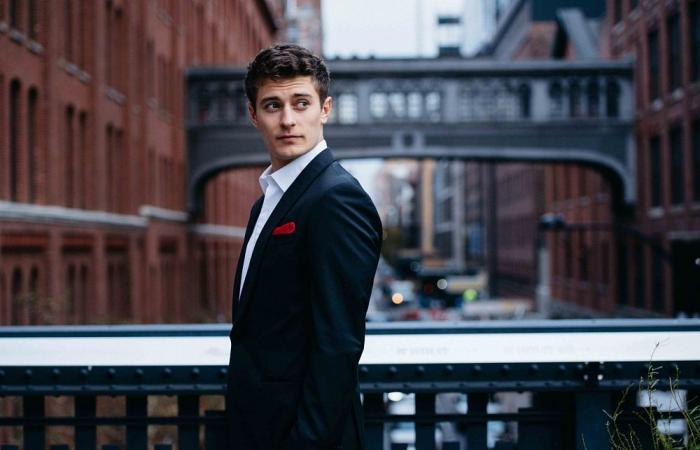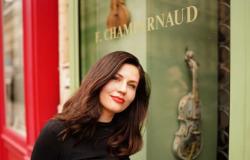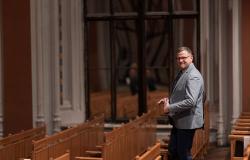The guest of “Klasikas” is the world-renowned countertenor Jakub Juzef Orlinski, whose concert at the Latvian National Opera will take place on May 1. According to the New York Times, “Orlinski’s performance combines a beautiful sound with an unusual unity of voice timbre and brilliance throughout the entire range”. The influential British media “The Telegraph” named him the 2018/2019 Player of the Year. the main star of the season next to the famous opera artists Jonas Kaufmans, Elina Garanča. The singer has already received the international classical music industry award “Opus Klassik” three times, is a winner of the “Grammy” award and won the recognition of “The International Opera Awards 2021” in the nomination of Solo album (in collaboration with Maxim Yemeljanichev and his orchestra “Il Pomo d’Oro”).
In 2018, Orlinskis signed an exclusive contract with the sound recording company “Warner Classics/Erato”, and in the same year his first music CD “Anima Sacra” was released, which received critical acclaim and the “Opus Klassik” award. At the Latvian National Opera, Jakub Juzefs Orlinskis will sing his new program, which will include compositions by Henry Purcell, Johann Joseph Fuchs, Georg Friedrich Handel, as well as Polish composers Mecislav Karlovich, Stanislaw Monuško and Henrik Čiž. Michal Biel will play the piano accompaniment.
Inta Zēgnere: Have you really never been to Latvia even as a tourist?
No, never really, which is why I find this trip all the more exciting because it means discovering new places, new environments.
It is very interesting how music finds itself “agents” or ambassadors to represent it. How did music find you? Do you come from a musical family? Maybe you went to the opera and listened to baroque music concerts every week?
No, not at all. My family is involved in the visual arts. My mother is a painter and sculptor, and my father is a painter and graphic designer. On the other hand, grandfather and grandmother are both architects. True, when grandfather worked in his workshop, classical music often played there. On the other hand, I
when I was still a child, I started singing in an amateur choir, and this activity became my passion. We gave concerts, went to perform, had a wonderful time together, choir camps were held… I still have friends from the choir days.
Did you start to become aware of your voice already then? Maybe you were a soloist in a choir?
All the boys were already singing in the high registers in the choir, because the voice had not broken. But when I turned 16 years old, a small group of us from our choir decided to start an ensemble. There were nine members who wanted to play medieval chants. After that, we became interested in Renaissance music, but it already needed the involvement of countertenors. I was the bass baritone in the ensemble at the time.
So who will sing the countertenor part? We decided that we would draw lots. It so happened that one lot was drawn by me and the other by my friend. And from then on we started singing as countertenors.
Of course, we didn’t know how it was done professionally, but in any case, it brought us a lot of joy. Later, I started taking part in master classes, I studied with Eva Komarovska, who prepared me for the entrance exams for the Frederic Chopin University of Music in Warsaw, but there my teacher was Anna Radziejewska, to whom I am very grateful for the solid foundations. Later, I continued at the Opera Academy with Mathias Rexroth and Eitan Pessen, and at the Juilliard School I continued studying with Edith Wiens.
I watched a recording of you taking part in Joyce di Donato’s master classes and how she praised you for both your voice and your very appropriate instrumental phrasing. It must have been a great encouragement to hear such praise from her.
Yes of course. It was a great experience, I am very grateful to her. But already two years later we met on the stage of the opera, because I was asked to “jump” in the performance of Handel’s opera “Agrippa”, where Joyce di Donato played the main role, and I was Ottone, which is a very big role. The performance was recorded and nominated Grammy for the award. It was a very big event for me.
Who are your favorite characters on stage?
There is so much great music out there. Of course, I love singing Rinaldo in Handel’s Rinaldo, but for example, in the selection I sang Oberon from Benjamin Britten’s A Midsummer Night’s Dream, and that was also phenomenal, and it wasn’t baroque music.
Then another one of my favorite things I’ve done is Jonathan Dove’s opera The Flight. It is a contemporary work specially composed for the Glyndebourne Festival, and the work is absolutely extraordinary. I had the role of a refugee in this opera. Fantastic work. I would like to sing it again.
But of course there are many possibilities in baroque music. For example, I recently sang the viola part of JS Bach’s “St. John Passion” on Good Friday at St. Thomas Church in Leipzig, the city where Bach composed it exactly 300 years ago. It is extremely exciting to be involved in such projects, they are very big and important milestones for me, which I really appreciate and am grateful for.
What is your collaboration with the ensemble like? Il pomo d’Oro? This group of musicians seems to hold a special place in your life.
Yes, absolutely.
When I started recording albums, my record companies Warner Classics and Erato I was asked: “Would you like to record with Il Pomo d’Oro? I was shocked because I was still very young, but these musicians collaborated with stars like Franco Fagioli, Max Emmanuel Cencic, Joyce Di Donato, really very bright stars.
It was a great honor for me to meet Giulio Dalesio, who is both the manager and also plays in the ensemble. I told him about the concept of my first album, he liked it and we started working on it together. So, since 2018, we have been cooperating all the time, because I love these musicians. They are very friendly and also great artists. It is one of the best baroque ensembles in the world. It is a great privilege and pleasure for me to both play and travel with them.
On the other hand, you will give a solo concert in Riga. What have you chosen for this program?
I really like working with Michał Biel. He is an excellent pianist and also a very good friend of mine. It is so interesting, intriguing and fascinating to discover Polish songs in particular to the public. Of course, we also have baroque pieces.
We will start the concert with Baroque and end with Baroque, but in the middle we will play Polish music, which we really like to open to the public, especially outside Poland, to show what Polish music is, what our heritage is.
We have toured almost all of Europe and North America with these songs and now we are happy to bring them to Latvia.
What are these songs? Are they folk songs or maybe baroque music?
No, it’s not baroque music. These are songs from the end of the 19th century and the beginning of the 20th century. These are songs composed by, for example, Stanislav Moniusko, Mecislav Karlovic and Henrik Čiž. We will bring such three groups of songs to Riga. The songs are really wonderful and emotionally charged. For example, Karlowicz wrote these songs when Poland didn’t really exist on the world map because we were occupied. And in these songs you really feel the struggle, hope, love and longing. Very deep and strong emotions are woven into this music.
I think it’s no secret to the listeners that you’ve been passionate about breaking for many years. Baroque and break seem completely incompatible things.
I have been involved in many sports, but I especially like break because it is very creative. It has both movement and art and freedom, because you can do whatever you want and how you want. And all this is combined with music. I’m still dealing with it.
Do you also use these abilities on stage?
Yes. There was a show in Aix-en-Provence where I broke, then another show in Frankfurt and Glyndebourne. I have also done it in San Francisco and at the Metropolitan Opera House in New York. I don’t always break, but I use the abilities and skills I have learned, some individual elements.
Will we also experience it in Riga? Of course, your voice is the main magnet for going to a concert, but this other ability is also intriguing.
I don’t think I’ll use it, because I’m going to Riga to sing, but who knows… If the audience is fired up, all kinds of developments can happen (laughs). It cannot be predicted in advance. That is why life is beautiful.
Latvijas Radio invites you to express your opinion about what you heard in the program and supports discussions among listeners, however, reserves the right to delete comments that violate the boundaries of respectful attitude and ethical behavior.
Tags: baroque break Polish countertenor Jakubs Juzefs Orlinskis LR3 Latvijas Radio
-





